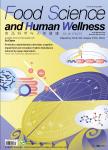Moderate red wine alleviates high-fat diet-induced atherosclerosis in ApoEmice via modulations of liver metabolism through gut microbiota remodeling
作者机构:College of Food Science and Technology Huazhong Agricultural University Key Laboratory of Environment Correlative Dietology (Huazhong Agricultural University) Ministry of Education Hubei Key Laboratory of Fruit & Vegetable Processing & Quality Control (Huazhong Agricultural University) Shangri-la Winery Co. Ltd.
出 版 物:《Food Science and Human Wellness》 (食品科学与人类健康(英文))
年 卷 期:2024年
核心收录:
学科分类:0832[工学-食品科学与工程(可授工学、农学学位)] 1002[医学-临床医学] 08[工学] 100201[医学-内科学(含:心血管病、血液病、呼吸系病、消化系病、内分泌与代谢病、肾病、风湿病、传染病)] 083201[工学-食品科学] 10[医学]
基 金:EL acknowledges the research funds from the National Natural Science Foundation of China (32272294)
摘 要:Red wine has a good potential for alleviating atherosclerosis, but the mechanisms related to hepatointestinal circulation remain to be elucidated. This study showed that administration of a high-polyphenol red wine (16 mL/kg/day) for 16 weeks significantly reduced the atherosclerotic lesion in high-fat diet-fed ApoE-/-mice. The total cholesterol (TC) and low-density lipoprotein cholesterol (LDL-C) levels of plasma were lowered by 11.54% and 18.98%. The pro-inflammatory cytokines including interleukin-6 (IL-6) and tumor necrosis factor (TNF-α) levels were decreased by 27.59% and 31.92%. Red wine also reduced triglyceride (TG) level and lipid deposition in the liver, and increased the concentration of total bile acids (TBA). Untargeted metabolomics analysis indicated that red wine modulated the disorder of liver metabolism by regulating sphingolipid signaling pathway, sphingolipid metabolism, glycerophosphlipid metabolism, choline metabolism and bile secretion. 16S rRNA sequencing revealed that red wine increased the abundance of Akkermansia and Bifidobacterium and reduced the abundance of Mucispirillum, Romboutsia, Lactobacillu, Bilophila and Blautia, along with the increased concentrations of short-chain fatty acids (SCFAs) in feces. These findings indicated that red wine could exert anti-atherosclerotic effect by regulating gut microbiota, restoring SCFAs, alleviating liver metabolic disorders.



